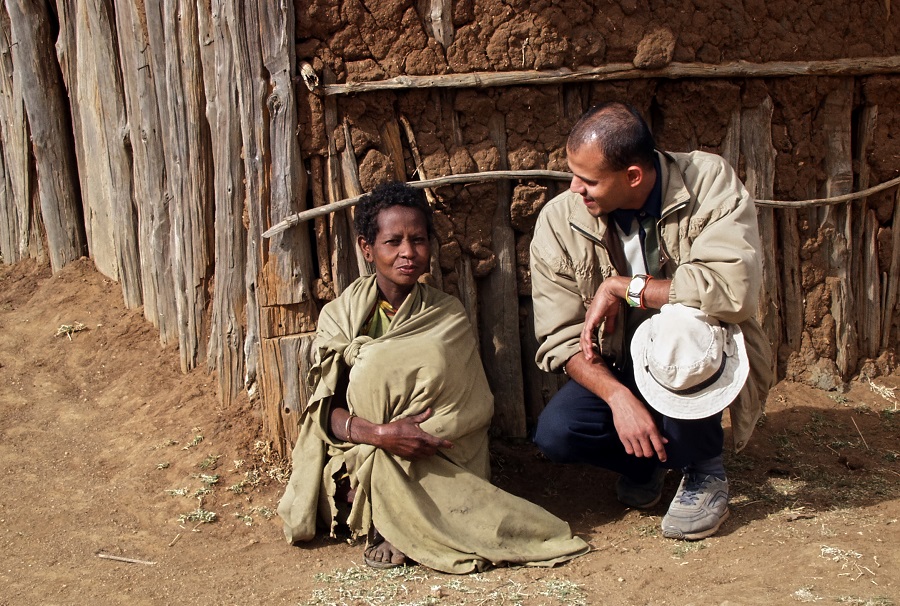Divine Word Parish Feeding Program began in 2014 as a weekly support to the poor and needy, old and abandoned of Kayole, a suburb of Nairobi, Kenya. The program offers basic packets of food to lift the needy above hunger. It has gradually grown to a weekly and monthly feeding program for street children and aged people who have been abandoned.
Divine Word Missionaries came to Kayole in 1990 to offer pastoral and social work. While offering these services, the missionaries identified a dire need for medical services in the Kayole area. This led to the creation of the Divine Word Parish Health Centre. In 2014, when I was pastor of Divine Word Parish, I turned my attention to the very hungry and dejected poor of the area. I decided to work with them to give dignity to these people who had lost hope of being supported by society. By feeding them, we empower them to know all is not lost.
Where the ministry takes place
The Kayole area has a population of about 600,000 people, and a great number of them are poor. Many are unemployed. Kayole is nearly surrounded by slums — Soweto, Matopeni, Spring Valley and Gatwikira — each less than 1 kilometer from Divine Word Parish.
The program aims to feed the poor every weekend. Food packets are distributed each Saturday at the church compound. One Saturday each month we also prepare a meal for as many as 180 people. The feeding program’s goal is to ensure that beneficiaries will not depend solely on church aid. It is a long-term program to see that beneficiaries can sustain themselves in the years to come.
Feeding the most in need
The ages of our beneficiaries range from 6 to 98. Most adults in the program are single mothers. Out of 44 elderly beneficiaries in the program, only two are men. The 140-plus children live in the streets or are orphans.
Many of these people have physical illnesses that include headaches, upsets stomachs, chest problems, muscle cramps and general weakness. A significant number of beneficiaries suffer from chronic ailments such as heart disease and HIV/AIDS. Unfortunately, we do not have the finances to look after their medical needs, but we do aim to provide healthy and balanced diets to those with HIV/AIDS.
We have a social worker who conducts home visits for those who have homes. From these visits we have learned that many of our beneficiaries do not have decent homes. Most live in subsidized houses made out of cardboard boxes with leaking rooftops and dirt floors. Many of them sleep on old rags.
Program challenges — receiving adequate financial support
The feeding program has faced great challenges because we lack adequate financial support. We depend on the charity of the Christian populace to give us the food packets, meat and vegetables. Our parishioners have been a great help. We collect food for the program each Sunday during Mass. Sometimes, however, we get barely enough and must subsidize the program through the support of well-wishers.
Usually, we have between 160 and 180 street children together with street families coming to eat in the feeding program. The weekly cost of our feeding program amounts to between $1,200 and $1,500 in American money.
The food packets, 180 in total, are distributed every Saturday morning, and the participants come from the streets to the church compound to collect them. The packets are distributed by the parish social worker, who has visited the people’s living places and knows them. On the church compound they feel loved and wanted.
On the Saturday of the communal feeding, the meal is served during lunch hour, 1 p.m. The food is prepared by a church volunteer. Some parish youths give up their time to wash the dishes after the meal. Before the meal, these youths go to the streets to invite participants to the church compound. All needy people are welcome regardless of their religion. During the meal our young people engage with the street children and encourage them to leave the streets and also to avoid drugs.
Hopes and dreams for the future
Besides offering food to the poor, one objective of the program is to provide children a safe respite from the streets. My hope is that at time goes by the children who are ready to leave the streets will find a place in our primary school, where we can help them to fit into society once again. That is a tall order, but it is possible with the help of good people.
The program also looks after elderly people abandoned by their families and left to die of hunger. One of our objectives is to lower the mortality rates of these desperate people.
As it tends to unemployed mothers, street children and the neglected elderly, our feeding program has become a rescue mission for both the young and the old. Over the years the number of people being fed will increase.










